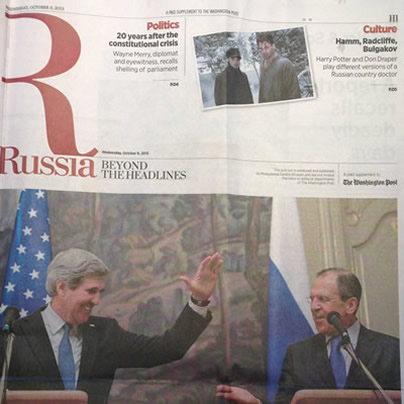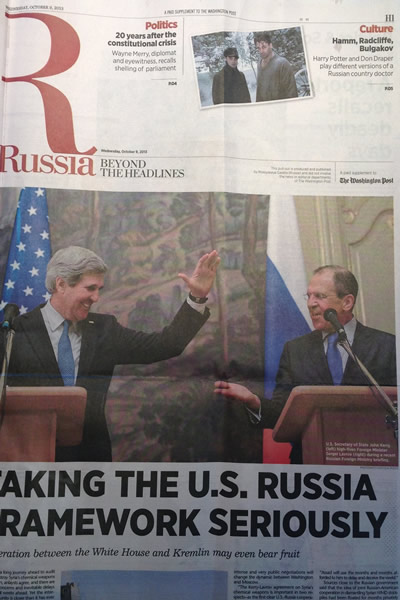Local
Washington Post publishes pro-Russia supplement
Oct. 9 insert lacked references to LGBT rights record

The Washington Post’s Oct. 9 print edition included a paid supplement produced by a Kremlin-backed newspaper that lacked any references to the ongoing controversy over Russia’s LGBT rights record.
Rossiyskaya Gazetá produced the insert – Russia Beyond the Headlines – that contained, among other things, an op-ed from Jeffrey Mankoff of the Center for Strategic and International Studies in D.C. He cited portions of the speech that Russian President Vladimir Putin delivered during a meeting of the Valdai International Discussion Club, a Russian think tank, that took place last month.
“Discussing his own view of Russian identity, Putin criticized the West for abandoning its Christian roots and ‘placing on the same level families with many children and single-sex partnerships, belief in God and belief in Satan,’” Putin said, according to Mankoff. “This cultural relativity, according to Putin, is ‘a direct path to degradation and primitivization, to a deep demographic and ethical crisis.’”
The Oct. 9 supplement is not the first time the Washington Post has published a Russia-specific insert.
The newspaper first published a Russia-themed supplement – Russia Now – in 2007.
Russia Beyond the Headlines said in a press release last month it decided earlier this year to redesign and revamp the supplement. It reappeared under the aforementioned name in the Washington Post’s Sept. 11 issue with a lead story that focused on the controversy surrounding the Russian law that bans gay propaganda to minors.
The article quoted Lyudmila Alexeyeva of the Moscow Helsinki Group, an organization that monitors human rights in Russia, as describing the statute that Putin signed in June as “a step toward the Middle Ages.” The Sept. 11 supplement reported Kirill Kobrin of Radio Free Europe’s Russia Service said he feels “it was unthinkable to even discuss these issues 20 years ago in Russia.”
“Under the Kremlin’s lead, LGBT rights are the focus of public attention and debate in Russia – albeit censored debate,” the Russia Beyond the Headlines article reads.
The New York Times on Sept. 18 published an eight-page Russia Beyond the Headlines supplement that contained articles about the gay propaganda law and coming out in the country. Putin reiterated his opposition to air strikes in Syria in an op-ed that ran in the newspaper less than a week earlier.
Ketchum PR, a public relations firm that represents Putin, placed it in the New York Times. Pro Publica reported the New York-based company received more than $1.9 million in fees and expense reimbursements from the Russian government from December 2012 through May.
The New York Times included another Russia supplement in its Oct. 16 print edition that contained an article on the arrest of 30 Greenpeace members last month who tried to board a Russian oil platform. The insert also contained a reference to the LGBT advocates who protested Russia’s gay rights record during the Metropolitan Opera’s opening night gala in New York last month.
Washington Post spokesperson Jennifer Lee declined to tell the Washington Blade how much the Russia Beyond the Headlines insert cost, but she confirmed it was a paid supplement and the advertiser provided the content. It contained a disclosure on the front page that said “it did not involve the news or editorial departments of the Washington Post.”
The top margin of each subsequent page contained a disclosure that stated the insert was “a paid supplement to the Washington Post.”
Observers and even journalists themselves have questioned the way Russian media outlets have covered the gay propaganda law, Russia’s LGBT rights record and the controversy surrounding it.
Gay American journalist Jamie Kirchick on Aug. 21 challenged Russia’s LGBT rights record during an interview with the Kremlin-backed television network RT on the sentencing of former U.S. Army private Chelsea Manning to 35 years in prison for leaking classified documents to Wikileaks.
“Being here on a Kremlin-funded propaganda network I’m going to wear my gay pride suspenders and I’m going to speak out against the horrific anti-gay legislation that Vladimir Putin has signed into law, that passed unanimously by the Russian Duma that criminalizes homosexual propaganda,” Kirchick told anchor Yulia Shapovalova. “It effectively makes it illegal to talk about homosexuality in public. We’ve seen a spate of violent attacks on gay people in Russia.”
RT aired a segment on calls to boycott the 2014 Winter Olympics in Sochi, Russia, in response to the country’s LGBT rights record less than two weeks before Kirchick appeared on the network to discuss Manning. The journalist further criticized Shapovalova and her colleagues before RT took him off the air.
Anton Krasovsky, the former editor-in-chief of the pro-Kremlin Kontr TV, said the television station fired him in January after he came out as gay during a segment on the gay propaganda law.
The Washington Post in recent weeks has published a number of stories on the controversy over Russia’s LGBT rights record and how it threatens to overshadow the Sochi games. These include a Sept. 26 article on the International Olympic Committee’s position that it has no authority to challenge the gay propaganda law and Alex Ovechkin of the Washington Capitals’ response to a question about it during the lighting of the Olympic torch in Greece late last month.
Amazon.com founder Jeff Bezos, who bought the Washington Post in August and contributed $2.5 million to a group that backed a successful 2012 ballot measure that secured marriage rights for same-sex couples in Washington State, did not return the Blade’s request for comment.
Kelly McBride of the Poynter Institute, a media ethics watchdog, told the Blade that paid supplements and advertorials have become common in newspapers. She noted the Washington Post’s use of different fonts throughout the Russia Beyond the Headlines supplement is “common practice” and “is amazingly effective at cueing regular readers to advertising content.”
“Combined with the disclosures, it looks to me the [Washington Post] is within the standard practice of the industry,” McBride said.
District of Columbia
D.C. Black Pride theme, performers announced at ‘Speakeasy’
Durand Bernarr to headline 2026 programming

The Center for Black Equity held its 2026 DC Black Pride Theme Reveal event at Union Stage on Monday. The evening, a “Speakeasy Happy Hour,” was hosted by Anthony Oakes and featured performances by Lolita Leopard and Keith Angelo. The Center for Black Equity organizes DC Black Pride.
Kenya Hutton, Center for Black Equity president and CEO, spoke following the performances by Leopard and Angelo. Hutton announced this year’s theme for DC Black Pride: “New Black Renaissance.”
Performers for 2026 DC Black Pride were announced to be Bang Garcon, Be Steadwell, Jay Columbus, Bennu Byrd, Rue Pratt and Akeem Woods.
Singer-songwriter Durand Bernarr was announced as the headliner for the 2026 festivities. Bernerr gave brief remarks through a video played on the screen at the stage.
DC Black Pride is scheduled for May 22-25. For more information on DC Black Pride, visit dcblackpride.org.
Virginia
Arlington LGBTQ bar Freddie’s celebrates 25th anniversary
Owner asks public to support D.C.-area gay bars

An overflowing crowd turned out Sunday night, March 1, for the 25th anniversary celebration of Freddie’s Beach Bar, the LGBTQ bar and restaurant located in the Crystal City section of Arlington, Va.
The celebration began as longtime patrons sitting at tables and at the bar ordered drinks, snacks, and full meals as several of Freddie’s well-known drag queens performed on a decorated stage.
Roland Watkins, an official with Equality NoVa, an LGBTQ advocacy organization based in the Northern Virginia areas of Arlington, Alexandria, and Fairfax County, next told the gathering about the history of Freddie’s Beach Bar and the role he said that owner Freddie Lutz has played in broadening the bar’s role into a community gathering place.
“Twenty-five years ago, opening a gay bar in Arlington was not a given,” Watkins told the crowd from the stage. “It took courage, convincing, and a deep belief that our community belongs openly, visibly, and proudly,” he said. “And that belief came from Freddie.”
Watkins and others familiar with Freddie’s noted that under Lutz’s leadership and support from his staff, Freddie’s provided support and a gathering place for LGBTQ organizations and a place where Virginia elected officials, and candidates running for public office, came to express their support for the LGBTQ community.
“Over the past 25 years, Freddie’s has become more than a bar,” Watkins said. “It has become a community maker.”
Lutz, who spoke next, said he was moved by the outpouring of support from long-time customers. “Thank you all so much for coming tonight and thank you all so much for your support over the past 25 years,” he said. “I can’t tell you how much that means to me and how much it’s kept me going.”
But Lutz then said Freddie’s, like many other D.C. area gay bars, continues to face economic hard times that he said began during the COVID pandemic. He noted that fewer customers are coming to Freddie’s in recent years, with a significant drop in patronage for his once lucrative weekend buffet brunches.
“So, I don’t want to be the daddy downer on my 25-year anniversary,” he said. “But this was actually the worst year we’ve ever had,” he added. “And I guess what I’m asking is please help us out. Not just me, but all the gay bars in the area.” He added, “I’m reaching out and I’m appealing to you not to forget the gay bars.”
Lutz received loud, prolonged applause, with many customers hugging him as he walked off the stage.

In an official statement released at the reveal event Capital Pride Alliance described its just announced 2026 Pride theme of “Exist, Resist, Have the Audacity” as a “bold declaration affirming the presence, resilience, and courage of LGBTQ+ people around the world.”
The statement adds, “Grounded in the undeniable truth that our existence is not up for debate, this year’s theme calls on the community to live loudly and proudly, stand firm against injustice and erasure, and embody the collective strength that has always defined the LGBTQ+ community.”
In a reference to the impact of the hostile political climate, the statement says, “In a time when LGBTQ+ rights and history continue to face challenges, especially in our Nation’s Capital, where policy and public discourse shape the future of our country, together, we must ensure that our voices are visible, heard, and unapologetically centered.”
The statement also quotes Capital Pride Alliance CEO and President Ryan Bos’s message at the Reveal event: “This year’s theme is both a declaration and a demand,” Bos said. “Exist, Resist, Have Audacity! reflects the resilience of our community and our responsibility to protect the progress we’ve made. As we look toward our nation’s 250th anniversary, we affirm that LGBTQ+ people have always been and always will be part of the United States’s history, and we will continue shaping its future with strength and resolve,” he concluded.
-

 India5 days ago
India5 days agoActivists push for better counting of transgender Indians in 2026 Census
-

 Advice5 days ago
Advice5 days agoDry January has isolated me from my friends
-

 National5 days ago
National5 days agoAfter layoffs at Advocate, parent company acquires ‘Them’ from Conde Nast
-

 District of Columbia5 days ago
District of Columbia5 days agoCapital Pride reveals 2026 theme



















